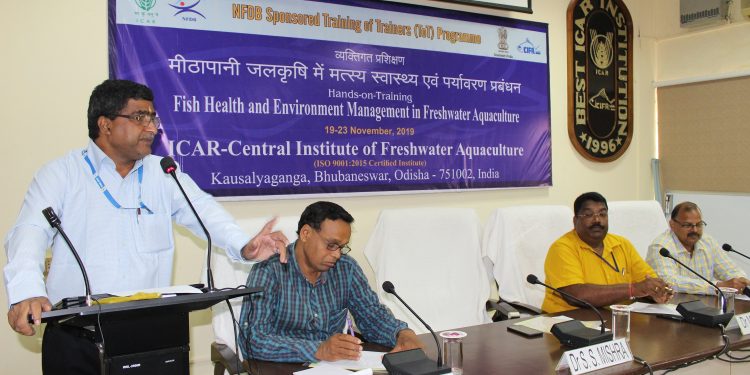Bhubaneswar: ICAR-Central Institute of Freshwater Aquaculture, Bhubaneswar, in association with National Fisheries Development Board (NFDB), Hyderabad, under Department of Fisheries, Union Ministry of Fisheries, Animal Husbandry and Dairying Tuesday launched a five-day training of trainers (ToT) programme on Fish Health and Environment Management in Freshwater Aquaculture. The programme will continue till November 23.
The programme was inaugurated by NFDB senior executive, Kausalyganga, Manas Kumar Sinha, ICAR-CIFA, Bhubaneswar, head of division and course director SS Mishra, Nabarangpur district fisheries officer Munwar Marandi and principal scientist, CIFA, P Swain.
Thirty two participants including state government fisheries officials, farmers and entrepreneurs from 11 states and union territories – Haryana, Uttar Pradesh, Madhya Pradesh, Maharashtra, Tamil Nadu, Pondicherry, New Delhi, Telangana, Andhra Pradesh, Chhattisgarh, West Bengal and Odisha – attended the training programme.
SS Mishra, in his opening address, briefed about the prospects of the NFDB sponsored training program for skill development of fishery officials, entrepreneur and farmers on various aspects of fish health management including pond water quality management.
He emphasised on three major components of blue revolution – quality seed production, quality feed and health management of culture environment – as key to sustainable production.
PK Sahoo, senior scientist, highlighted the importance of health management especially parasitic diseases, which have been a cause of concern in many parts of country. He stressed the importance of maintaining ideal water quality parameters for healthy fish production.
M Marandi appreciated the efforts of ICAR-CIFA in conducting such type of skill development programmes and training of trainers’ programmes over the years for the cause fisheries and aquaculture development in the country.
Sinha explained that the programme will help achieve the goal of doubling farmers’ income by 2022. He also delineated the scope and potential of country’s resources for fish production.







































